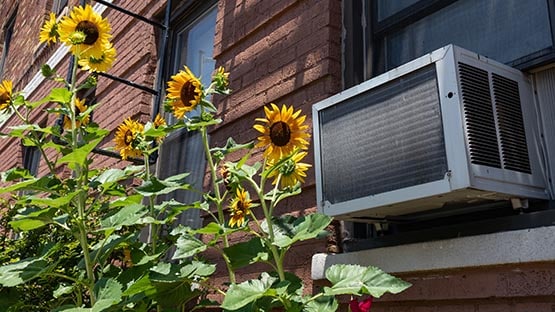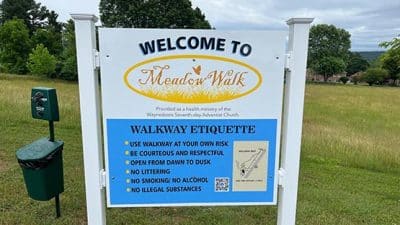
The topics presented for research papers were intended for high school students, but the students wrote them with college-level, in-depth thought and dedication.
Nineteen Stuart Hall students in five topic groups shared summaries of their research papers on the time period from 1912 to 1922 in “The Woodrow Wilson Presidential Library-Stuart Hall School Student Research Symposium” Monday night.
Topics shared at WWPL were LGBTQ and Women’s issues; Ideology and Revolution; The 1918 Flu Pandemic, Sports in the Wilsonian Era and Beyond; and World War I: Politics and Technology.
“I thought all of the papers did a really excellent job of balancing that nuance of political and legal gains for underrepresented and minoritized populations while also balancing how that slower social and economic progress was clear and impacted individuals,” Cameron Shirley, Mary Baldwin University Chief of Staff, said, before moderating the first topic group on LGBTQ and Women’s issues.
A former high school history teacher, Shirley said that all of the papers balanced well the use of primary and secondary sources.
Junior Liliana Badalamenti’s paper explored women in World War I, the effects the war had on them and the impacts women had on the war effort. Liliana said she was curious because she had not learned much about the impact the women had on the outcome of the war. She learned that while women did have quite an impact on the war’s outcome, the women’s suffrage movement made little progress.
“Ultimately, however, their dedication to providing resources and materials to the frontlines as well as on the home front gained them their right to vote, which they had been fighting for for decades,” Liliana said.
Junior Theoren W. Griffin’s “The Gay After Tomorrow: LGBT Violence Throughout the Decades” explored how members of the LGBTQ community were treated then, and how that treatment changed or did not change into the 21st Century. Theoren’s paper proved that change happened “slowly and incrementally.” Not just one or two events of violence happened, but multiple incidents against the LGBTQ community.
Theoren found that in the 1910s as in the 2020s, members of the LGBTQ community are being killed “by accident” or in ways that appear to have no relation to the fact the individual is a member of the community.
“I did learn just how gruesome the past for the community is, but I did also learn how resilient they are and how they come together after a hard time,” Theoren said.
Women’s suffrage and how it affected the 21th Century was Avery Hess’s topic of choice. The junior learned the fight for women’s rights was “incredibly effective in giving women legal rights” but women received less social rights. While the 19th Amendment gave American women the right to vote and the overturning of Roe v. Wade later took away reproductive rights, socially, women’s lives did not change.
“I learned a lot from doing this research, but my biggest takeaway is the fight for gender equality is far from over,” Avery said.
“Rainbow Revolution: How the Gay Rights Movement Painted a New Future” by Adalyn Krusz, a junior, shared how homophobia led to the LGBTQ community protesting.
“The treatment that many of the community suffered, such as verbal, physical violence and emotional torture, was one that no human should have to endure especially as a result of loving someone,” Adalyn said.
Junior Morgan Muntean’s paper, “Plowing the Political Field: Peasant Women and the Seeds of Revolution in Imperial Russia” was a deep dive into how the Bolshevik Revolution affected women.
Morgan said a challenge with her research was finding sources that shown a negative light on Communism.
The second topic group included juniors Clara Bortolot and Angel Dresden, as well as sophomore Garrick Andrew Church and their research on Ideology and Revolution. Clara discovered how and why Communism in China developed from Communism in Russia. Garrick’s paper explored the origins of American leftist thought. Angel shared “Violence in the Mexican Revolution of 1910.”
Of the 1918 Flu Pandemic, Hieu Bui, a junior, shared his research comparing the 1918 pandemic with the 2019 pandemic of COVID. Sophomore Christian Scott’s paper shared what can be learned from the 1918 pandemic. Senior Trang Trong shared what she learned of similarities and differences between the two pandemics.
Sports in the Wilsonian Era and Beyond was moderated by JMU History Chair David Dillard. He said the topic’s purpose was to explore how sports drive us and impact us.
The topic brought out Amari Catlett’s passion for football in her paper, “Changes in the NFL: 1920 to Present.”
Malachi Payne, a junior, researched and wrote “The Effect of the 1910s and 20s on Sports,” and how the 1918 flu affected American sports.
Enzo Ruberwa’s “European Football in the 1910s and 20s” gave the junior the opportunity to compare the NFL in the 1910s to the NFL enjoyed by fans today.
Ethan Baiotto, an 11th-grader, braved Politics and Technology to explore how the elections of 1912 and 1916 affected World War I. Senior Laurraine Ishimwe tackled “The Impact of the Treaty of Versailles on French Society, Economy, and Foreign Policy in the Aftermath of World War I.”
The technology of aircrafts in the first World War and how it affected World War II and aviation in the modern world was explored by junior Lucas Rosolina, while sophomore Luke Shiflett focused on “World War I Technology to the Present Day.”
Frank Zhang, a senior, was challenged with the task of researching Adolf Hitler, who was a soldier in World War I, and how the experience shaped the man who would become dictator of Germany in the 1930s and cause the Holocaust of millions of Jews.
Stuart Hall history teacher Tim Layne said the symposium and the students’ papers “demonstrate just how much history matters.”
“One of the most satisfying things in the career of a teacher is to get an idea and then have your students take that idea and blow it out of the water,” Layne said.










